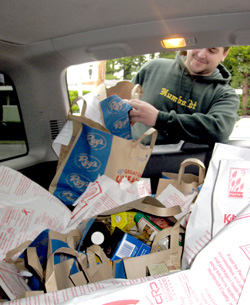
Donated meal points will be used to purchase food from HSU’s vendor, and these relief food supplies will be delivered directly to Food for People, the county’s food bank. Students, staff and faculty who do not have meal plans, but have C Cards, can also donate. In coordination with this, there will also be food barrels in various campus locations for the collection of canned food items. The entire campus community is encouraged to do some “Spring Cleaning” and donate non-perishable food.
Miguel Rojas, a Service Learning Intern and a student organizer of the food drive, said: “This is one of the simplest ways for students to get involved and promote change. Don’t let your points go to waste. Don’t throw away the chance to give back to your community today.”
The Service Learning Center’s efforts are part of a nationwide movement, spurred by the National Feinstein Foundation, to alleviate hunger across the country. The more food and money that an agency collects regionally, the more money it receives nationally from the Feinstein Challenge. This is especially a vital time to bring in more local donations to the Food Bank, as their requests for food have increased by 25 percent.
Partners on campus include Youth Educational Services (Y.E.S.), the Residence Hall Association, Ron Rudebock and the entire Dining Services Staff.
To donate points, students, staff and faculty should visit http://studentaffairs.humboldt.edu/slee/ to download a donation form. Once they fill out this form, they should return it to the Service Learning Center, Nelson Hall West (NHW) 139, until April 27. Student organizers of the food drive will also be tabling in the “J” during the hours of 5 p.m. to 7 p.m., until April 22, as well as on the Quad throughout the month.
Humboldt State Teams With Feinstein Foundation
The United States is the wealthiest country in the world, yet 38.2 million Americans are at risk of experiencing hunger each year. Such pervasive hunger does not exist because of a lack of resources – the United States produces more than enough food to feed everyone in the country – it is the result of poor distribution and distorted priorities. Programs designed to alleviate and end hunger are under-funded, even with more people turning to emergency food providers as the cost of living continues to rise. Unfortunately, relief agencies are often forced to turn away those in need due to a lack of resources to meet the growing demand. It is clear that hunger is becoming a growing epidemic that is striking communities nationwide.
To address this problem and offer much needed resources, the National Student Campaign Against Hunger and Homelessness has teamed up with the Feinstein Foundation to engage students in a challenge that focuses on a new set of priorities. Through the annual Feinstein Challenge, the National Student Campaign will work with universities, high schools, middle schools, and elementary schools to host food drives, fundraisers, and educational events during the months of March and April that will benefit local hunger relief agencies in communities across the country. Not only will the Feinstein Challenge generate much needed resources, it will also engage students in civic education, community service, and activism.
For the past eleven years, the Feinstein Foundation has pledged $1 million to be distributed among hunger relief agencies that organize food and fundraising drives during the months of March and April in conjunction with the Feinstein Challenge. Each agency receives a percentage of the $1 million based on the amount of food and money it collects during this time period in ratio to the total amount of food and money raised nationwide. In other words, the more food and money an agency raises, the more money it will receive from the Feinstein Challenge.
Through the Feinstein Challenge, agencies will raise more money, communities will receive more resources, and students and schools will become more active in the largest national grassroots effort to alleviate hunger in the United States.
The Feinstein Foundation will provide the money and motivation, the National Student Campaign will provide the materials and weekly support (including organizing strategies, advice, tips), and students of all ages will provide the volunteers, ideas, and action.
For more information, contact the Service Learning Center at (707) 826-4964 or jmb137@humboldt.edu